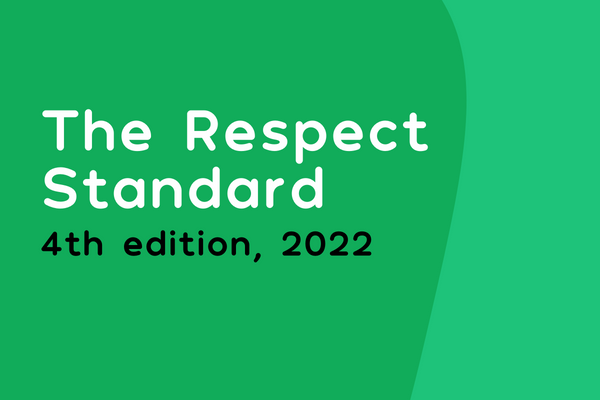Respect has launched the fourth edition of its quality assurance framework: the Respect Standard. A definitive guide for commissioners, the Standard is at the heart of our accreditation process, which assesses domestic abuse perpetrator interventions for safety and effectiveness.
The Standard, first launched 14 years ago, provides both clear guidance and robust assessment for services working with perpetrators of domestic abuse. These services can range from early interventions to long-term behaviour change programmes and services working with high-risk, high-harm perpetrators. Services achieving accreditation against the Standard can refer to themselves as Respect accredited, a mark of quality that guides commissioners in their funding decisions, with accreditation regarded as an indicator of trustworthy, safe and effective provision.
The Standard assesses how organisations are managed, how they deliver their intervention, how they support survivors, and how they prioritise equality, diversity and inclusion. Now in its fourth edition, the Standard has been further refined, with changes including:
- Making the Standard relevant for more types of perpetrator interventions, such as early response/awareness interventions (for example Change that Lasts, Make A Change) and intensive case management interventions (for example the Drive Project).
- Separating the support for survivors into a standalone section. Specialist provision for survivors must be at the centre of any perpetrator intervention, and without it, adult and child survivors can be at risk of harm. Expert survivor provision, given separately but in parallel with the perpetrator intervention, ensures the survivor has the support they need, and means they can be kept abreast of the perpetrator’s progress and any emerging risks.
- Streamlining the accreditation process so it’s more affordable and accessible for more services, without compromising on safety. This will make accreditation a possibility for more services, giving greater national coverage of accredited perpetrator services.
- Aligning the Respect Standard with the Home Office’s Standards for Domestic Abuse Perpetrator Interventions, a set of principles for perpetrator interventions in England and Wales. The two standards complement one another, with Respect’s Standard providing the basis for a wider accreditation process ensuring the safety and effectiveness of perpetrator interventions.
Jo Todd CBE, CEO of Respect, said,
“We’re proud to launch the fourth edition of the Respect Standard: the benchmark for consistent, safe and effective work with perpetrators of domestic abuse, and the basis for our rigorous accreditation process. As always, our focus is on ensuring quality provision that centres the needs of survivors and guides the informed commissioning of perpetrator services. With the Government’s Perpetrator Fund launching this week, this could not be more relevant. We are calling on commissioners to look to Respect’s accredited services for safe, high-quality, interventions”
Nicole Jacobs, Domestic Abuse Commissioner, said,
“I endorse the Respect Standard because it is a quality framework for perpetrator work and puts survivors at the heart of its accreditation requirements. The Standard is vital in the fight against domestic abuse and I welcome this updated edition which has been broadened to cover more types of perpetrator interventions. Domestic abuse is a horrific crime which destroys lives and we need to ensure that there is an effective and safe way of addressing the behaviour of abusers with victims’ voices and support for survivors at the very heart of the process.”
Dame Vera Baird, Patron of Respect, said,
“Perpetrator work is a speciality that has grown exponentially over the last few years, both in terms of awareness and provision, so it’s vital that those leading this work continue to ensure that the needs and safety of victims are prioritised. This new edition of the Respect Standard, with an entire section devoted to enhancing the safety and freedom of victims, shows that Respect is continuing its long tradition of putting victims at the centre of perpetrator work. The Respect Standard is the kitemark for all perpetrator work, nothing should be commissioned that hasn't attained it. I am pleased to be a Patron of Respect and to watch them going from strength to strength in this utterly key area of work.”





